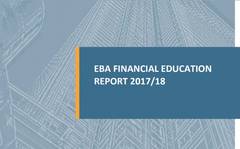
The European Banking Authority published its first report on financial education on Thursday 1 March, providing National Supervisory Authorities (NSAs) across the EU with an opportunity to share and compare experiences in terms of financial education. With the increasingly complex nature of financial services and investment tools, there is no question that educational initiatives for consumers need to evolve and adapt to this new reality. As established by the European Economic and Social Committee (EESC) in its report Financial Education for All, published in 2016, improved consumer protection and increased financial education are closely linked, stating that this results from: “the fragile position of the retail consumer faced with a market inundated with complex financial instruments and a financial sector that has to some extent been behaving irresponsibly by not informing people about the risks that these products entail”.
The EBA report is based on 84 educational initiatives taken on by NSAs responsible for supervising the financial services and products within the EBA`s scope of action. In the report, four key characteristics of the aforementioned 84 initiatives are investigated: subject matter, format, target group and type of output produced. The report evaluates different strategies in reaching the desired target group, understanding the specific educational need of the jurisdiction at hand and choosing the correct channel or campaign to reach said aim. The NSAs consulted by the EBA, report that face-to-face approaches to advice, courses and seminars, is preferred by consumers, and deemed the most effective. Looking at alternative less time-consuming channels for finance education, the NSAs report that they find it beneficial to combine traditional channels with newer, more innovative ones – a multichannel approach.
As the first, but hopefully not the last, report on the topic of Financial Education from the EBA, this report illustrates the emergence of and reliance on the “active consumer”. Not only will knowledgeable consumers be able to protect themselves and their savings, an educated public could contribute to the monitoring of today`s vast and increasingly complex financial system.
It is important to stress though, that financial education should in no way relieve financial institutions of their responsibility of providing individuals and businesses with effective, clear and comprehensible information.
